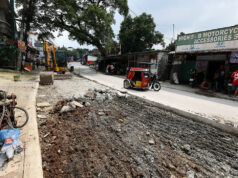Philippines secures P75.5-billion loan from Japan
THE governments of the Philippines and Japan on Tuesday signed two loan agreements worth P75.5 billion (around 154 billion yen) for two major infrastructure projects in the Visayas and Mindanao.
Finance Secretary Carlos G. Dominguez III and Japan International Cooperation Agency (JICA) Chief Representative Eigo Azukizawa sealed the agreement for the P57-billion (119-billion yen) loan for the construction of a fourth Cebu-Mactan bridge and coastal road project, as well as P18.5 billion (35 billion yen) in supplemental financing for the second phase of the Davao City Bypass Construction Project.
Both projects are under the “Build, Build, Build” infrastructure program, which the government expects to help spur growth as the economy recovers from the coronavirus crisis.
Mr. Dominguez said interest rates for the loans are at 0.10% per annum for non-consulting services and 0.01% for consulting services, with loans maturing in 40 years, inclusive of a 12-year grace period.
“We express our heartfelt gratitude to the people and the Government of Japan… for their generosity and earnestness in supporting our infrastructure modernization program. Given the challenging circumstances, these projects bring more support to our economic recovery well beyond their nominal value,” Mr. Dominguez said during the loan signing ceremony.
JICA will finance 75% of the P76.4-billion Cebu-Mactan Fourth Bridge and the Coastal Road Project through official development assistance (ODA), while the remaining P18.8 billion will be sourced locally.
The Japanese government said it will also provide funding for the project’s detailed engineering design. Construction of the bridge linking mainland Cebu and Mactan island will start next year and is expected to be completed by 2029.
At the same time, the new loan for the Davao City Bypass Construction Project will supplement the 23.9 billion yen or around P9.27-billion loan JICA extended in 2015. Project construction is scheduled to start this year while the road is expected to be operational by 2023.
“In a broader sense, I hope that these projects will also contribute to the economic recovery of the country amidst the COVID-19 pandemic as we fully support your government’s pronouncement that restarting and accelerating the ‘Build, Build, Build’ program should be one of many strategies for reviving the Philippine economy,” Mr. Azukizawa said.
During the press conference, Finance Undersecretary Mark Dennis Y.C. Joven said the two loans bring to $1.5 billion the total financing extended by JICA to the Philippines this year.
“In terms of execution, we’ve already signed $40 million worth of project loans excluding these two loans, on top of this, we have a pipeline of $2.35 billion for the year, which includes both program loans and project loans, from JICA,” Mr. Joven said.
Mr. Joven said JICA has supported the government’s infrastructure projects, saying they will likely stick to the original pipeline of projects.
With more foreign loans coming in, Mr. Dominguez said the government will maintain a borrowing mix ratio of around 70:30 this year, in favor of domestic sources, and stay close to the previous years’ levels of 75:25.
To fund its coronavirus pandemic response, the government has raised a total of $6.508 billion via loans, bond sales and grants from foreign creditors as of early June. — Beatrice M. Laforga



